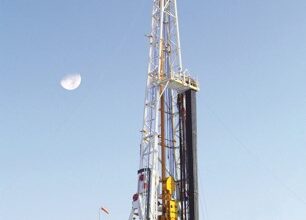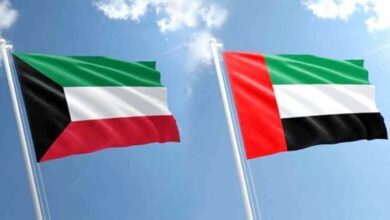Kuwaiti economy to grow by 2.6% in 2025, predicts IMF
The International Monetary Fund stresses the need for gradual reforms to boost Kuwait’s economic competitiveness, focusing on business environment development, transparency, economic openness, and labor market reforms to drive private sector growth.

• The International Monetary Fund (IMF) stated Kuwait’s gross domestic product contracted by 3.6% in 2023, primarily due to a 4.3% contraction in the oil sector, driven by OPEC+ production cuts.
• The IMF said Kuwait’s external financial accounts remain strong, with the current account surplus declining to 3.14% of GDP in 2023, and official financial reserves reaching $47.6 billion at the end of 2023.
• The IMF expected the Kuwaiti economy to remain in recession until the end of 2024 at -2.8%, before recovering in the medium term, reaching 2.6% in 2025 with the easing of restrictions on oil production, and then falling again to 2.2% in 2026.
The International Monetary Fund (IMF) has revised its forecast for the Kuwaiti economy, projecting a 2.6% growth in 2025, down from the 3.3% growth predicted in October, according to Al Qabas newspaper.
The IMF highlighted the beginning of a recovery in the non-oil economy and a slowdown in inflation, emphasizing the need for comprehensive and gradual reforms to enhance the economy’s competitiveness and diversification.
It continued that reform priorities include developing the business environment, increasing transparency, further opening the economy, and implementing labor market reforms to stimulate private sector-led economic growth.
Kuwait’s GDP contracted by 3.6% in 2023
In its closing report on the 2024 Executive Board consultations with Kuwait, the IMF stated that Kuwait’s gross domestic product (GDP) contracted by 3.6% in 2023, primarily due to a 4.3% contraction in the oil sector, driven by OPEC+ production cuts. However, the non-oil sector saw a modest 1% contraction, reflecting a decline in manufacturing activity during the first quarter.
The IMF added that Kuwait’s GDP contracted by 1.5% in the second quarter of 2024 compared to the same period last year, driven by a 6.8% contraction in the oil sector, which was partially offset by a 4.2% recovery in the non-oil sector.
It stated that inflation in Kuwait fell to 3.6% in 2023, reflecting declines in both core inflation and food price inflation, noting that core inflation decreased to 2.6% in September 2024 compared to September 2023.
Slowdown in credit growth
The IMF confirmed a slowdown in credit growth in 2023 due to high interest rates, but Kuwaiti banks maintained strong cash reserves and liquidity, while non-performing loans remained low and the level of provisions was adequate.
It welcomed the stability of Kuwait’s financial sector and the wise management of regulatory risks. The IMF recommended replacing the unlimited guarantee on bank deposits with a limited deposit insurance framework to mitigate risk, and suggested that the gradual easing of bank lending price limits could help support efficient risk pricing.
Current account surplus falls to 3.14% of GDP in 2023
The fund pointed out that the decline in oil production and prices has weakened the financial budget, although the state’s financial stability has been maintained. It explained that the country’s external financial accounts remain strong, with the current account surplus declining to 3.14% of GDP in 2023, and official financial reserves reaching $47.6 billion at the end of 2023.
It added that the government’s fiscal balance weakened and turned into a deficit of 3.1% of GDP in the fiscal year 2023–2024. However, the government’s financial balance (including investment income from the Generations Fund and profit transfers from state-owned companies) was more than 26% of GDP in the same fiscal year.
The IMF expected the Kuwaiti economy to remain in recession until the end of 2024 at -2.8%, before recovering in the medium term, reaching 2.6% in 2025 with the easing of restrictions on oil production, and then falling again to 2.2% in 2026.
Strong financial buffer against future shocks
The IMF welcomed the beginning of the recovery of Kuwait’s non-oil sector, the moderation of inflation, and the large volume of financial reserves, which provide a strong financial buffer against future shocks.
The fund also praised the focus of financial authorities on transitioning the country’s economy to a more vibrant and diversified one, stressing the importance of implementing a comprehensive and sequential package of financial and economic reforms.
The IMF emphasized Kuwait’s need to control the general budget and rationalize spending in the medium term to promote financial sustainability and intergenerational justice, calling for a more balanced approach that focuses on rationalizing spending, enhancing non-oil revenues, and increasing investment in infrastructure.
Need to expand the scope of corporate tax
The IMF highlighted the need to expand the scope of corporate tax in Kuwait to include all major local companies, and to adopt both value-added tax (VAT) and selective taxes. It also stressed the importance of containing spending on wages and mitigating subsidies on energy and water, while protecting the most vulnerable social groups.
It added that linking the exchange rate of the Kuwaiti dinar to the US dollar, along with an undeclared basket of currencies, remains an effective anchor for the country’s economy.
Reforms must to diversify Kuwaiti economy
The report suggested that the fiscal deficit in the budget rose to 6.6% of GDP in the fiscal year 2024-2025, as the decline in oil revenues offset the rationalization of spending. It pointed out that Kuwait’s economy is highly exposed to a variety of global risks due to its dependence on oil and its price volatility, slowing global growth, and the intensity of regional conflicts.
Local risks, on the other hand, are primarily related to the implementation of financial and structural reforms, which may either be delayed or expedited. These reforms are necessary to diversify the Kuwaiti economy, enhance its resilience, and encourage investment in the private sector.




























